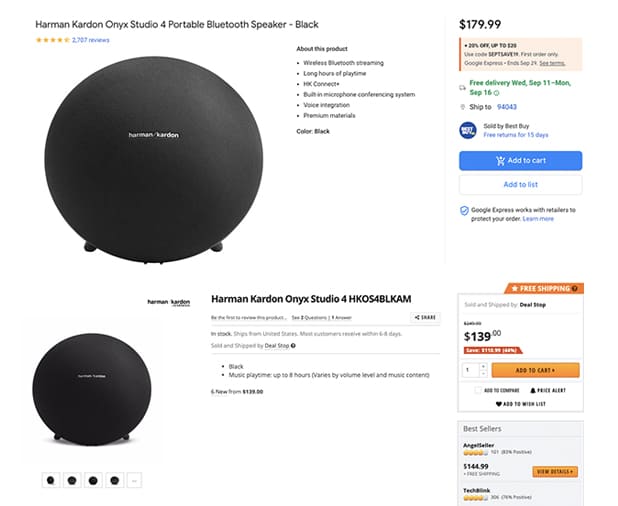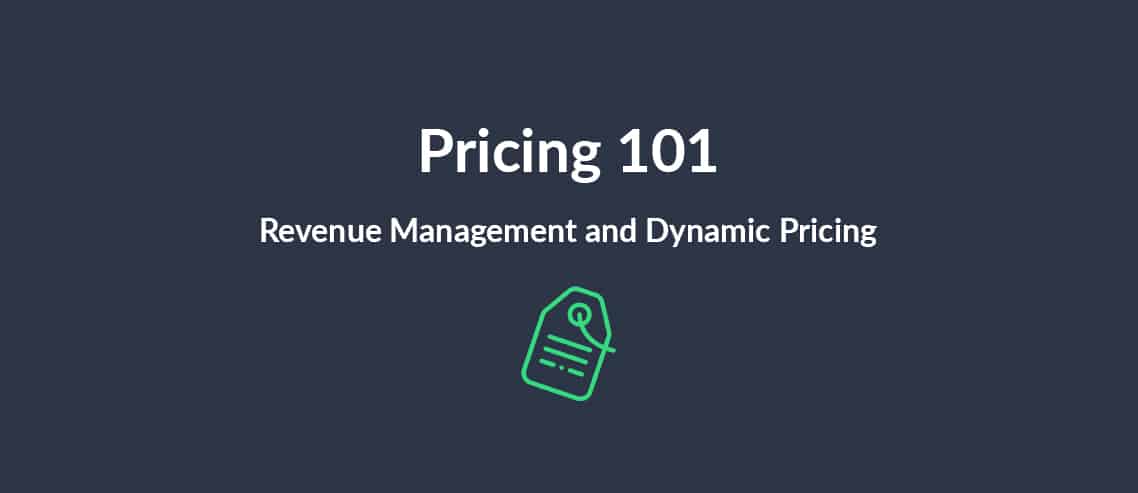Who buys a product before a quick price comparison online? No one.
Urban life compels us to look for convenience and speed. On top of that, we are spending more than our grandparents in city life. Therefore, we can’t afford to trifle away our money.
Mom-and-pop stores sound like a pleasant memory that can’t correspond to our modern-day needs. E-commerce, on the other hand, responds to convenience and time shortage problems, and it offers ease in the price comparison process. Thus, we live in a world where e-commerce is thriving and reshaping our economic behavior.
Since we want to optimize our spending, we compare prices before making a purchasing decision.
To understand this process, we’ll have a closer look at the purchasing process.
Why comparing prices became a customer behavior
Let’s put ourselves in customers’ shoes. Suppose you’ve decided to buy a Harman Kardon Onyx Studio 4. What will be the first thing you want to know?
Of course, it’s the amount you’re going to pay.

Since these products are completely identical, what differentiates these websites are the prices they offer. Naturally, 85% of consumers conduct online research before making a purchase online.
Without a doubt, there is an ever-mounting competition for online retailers and thus, so many options for customers. Luckily, price comparison websites rush to help consumers.
Comparison shopping engines
These tools (CSEs in short) help consumers detect the best prices among numerous websites. Google Shopping, PriceGrabber, Shopping.com, Shopzilla and various other price comparison sites offer an easy and fast way to locate the best prices.
More to that, websites like Shopular can track a consumer’s favorite stores and send notifications in case of any promotions/discounts.
Significance of price comparison for business owners
In a price-sensitive environment like this, it goes without saying you need to keep track of competitor prices. Setting fancy prices would not be helpful if you want to stay competitive.
On the other hand, if you sell products for a song, it runs the risk of ending up with low profit margins whereas your competitors benefit from higher ones. In this case, the extra money in competitors’ hands will go to innovation, advertising, and marketing. Again, this will impair your competitive strength.
Common mistakes
Error 1
Believe it or not, a lot of online retailers don’t look at competitor prices. Most of the time, they overprice their products and let potential customers slip away.
Especially in seasonal sales, where the majority of online stores are on sale, merely assuming they will go on sale is not good enough.
Think of 5 online stores selling sneakers. 4 of them track competitor prices, and one doesn’t.
When one of the four goes on a 40% Christmas sale, the other three go for similar amounts to stay competitive. However, the clueless one makes a 20% sale.
Supposing all five of them had similar prices before the sales, the one that doesn’t track will be left behind the competition.
Error 2
While setting prices, big companies calculate various determinants. SMBs don’ t have the same data, therefore they can’t make accurate calculations to optimize price-demand relationship. Instead of ignoring this relationship altogether, you can regularly monitor product reviews to see what customers think.
It would be even better if you spare the time to read the views from competitor websites. If you don’t have a review section yet, find out why you need to generate reviews.
Error 3
One technical issue we come across is the discrepancy between a product’s price on the website and what we see in a comparison shopping engine. Unfortunately, it’s a turnoff for most customers.
If the CSE automatically imports data from your website, you might want to contact their technical staff about the problem.
If you upload data to the CSE, the problem might initiate from either party. For example, data updates may take too long in some CSEs, resulting in inaccurate information.
In sum, depending on the method of data exchange, you’ll have to come up with quick solutions to preserve customer satisfaction.
Final thoughts
The following characteristics of the online retail industry contribute to our tendency to conduct price comparison research in advance of a purchase.
First of all, almost no product is unique to one seller. Meaning, consumers will look for the best price when the product is identical.
Secondly, customers have easy access to substitute websites. With one device, they can shop from various online stores, creating an environment of harsh competition.
Lastly, buyers can easily compare prices thanks to the price comparison sites designed for online shoppers. Even when they’re in a physical store, 65% make price comparisons on their mobile devices.
All three of these factors contribute to shoppers’ price sensitivity and by extension, force business owners to track competitors’ prices. When it comes to price comparison, remember:
- Not tracking competitor prices is the most common mistake that leaves you out of the competition.
- Setting prices without understanding the dynamics of and trends in the market will result in low conversion rates.
- Not noticing the technical issues resulting in a discrepancy between prices in website and CPEs will turn off potential customers.



Actually this blog is very nice in this site very helpful content. Thanks a lot.